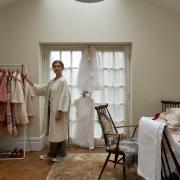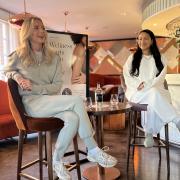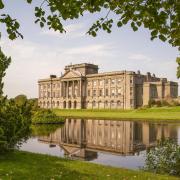His books introduced young readers to great figures from history but Lawrence du Garde Peach had quite a story, too.
They were books that gave generations of children their first glimpse at some of history’s most famous names. Alfred the Great, Charles Dickens, Napoleon and Bonnie Prince Charlie were among the figures whose life stories were told in the Ladybird Adventures from History series.
The series of 49 hardback books – which are now eagerly collected by enthusiasts – were published between 1956 and 1978, and 33 of them were written by one man.
Lawrence du Garde Peach led an extraordinary life and although he was a key figure in Manchester in the year part of last century, and a household name across the country, he has now been largely forgotten.
Peach was a playwright associated with the Manchester School of Dramatists in the first part of the 20th century and was a pioneer of radio broadcasting in the city who became famous as a BBC radio personality.
A Yorkshireman by birth and a Mancunian by adoption, Peach found himself coming to the defence of the city in a public debate in the mid-1920s. It had been suggested that there was a line of latitude of meanness connecting Leeds and Manchester and that Manchester was the meanest of meanest cities.

Peach replied that it was all very well for southerners to say that northerners are mean, but it was only because they want to get value for their money and would therefore tend to scrutinise both sides of a sixpence. He said that a brainless man was not possible in Manchester, whereas such a man could get by quite happily year after year down south.
Peach was born in Sheffield. His father was the Reverend Charles Peach, a Unitarian minister active in liberal politics. He was born into a family with a social conscience who eventually relocated to Manchester. In the 1890s Reverend Charles Peach together with Reverend Lawrence Scott – the brother of Manchester Guardian editor CO Scott – established a summer summer holiday camp programme in Derbyshire, for children from the slums Manchester and Sheffield.
The Peach family lived in East Meade, Chorltonville, and after leaving Manchester Grammar School, Lawrence won one of six university scholarships provided by Manchester City Council to Victoria Manchester University to read English. From there, he went on to take a PhD at Göttingen University in Germany.
Peach’s career as a playwright in Manchester took off before World War One. The independently wealthy Ibsen-enthusiast Annie Horniman had established the Gaiety Theatre in 1908 as the first regional – as well as the most progressive – repertory theatre in Britain. Free from commercial considerations, the theatre produced classic and local plays for new audiences. The company contained actors such as Basil Dean, Sybil Thorndike and her husband Lewis Casson who went on to achieve fame.
It was a theatre with reputation for serious, modern drama in the Lancashire idiom and in 1913 Peach’s had his first play, Wind O’ the Moor, produced by Lewis Casson and presented on the same bill as Allan Monkhouse’s Mary Broome.
Peach was back in Germany the following year and left just hours before the outbreak of war. On returning home, he was commissioned into the 8th (Ardwick) Battalion of the Manchester Regiment.
He was still active in the theatre. In March 1915 Peach’s play The Man and the Moon won the prize awarded by John Masefield, President of the Manchester University Stage Society, for the best one act play.
In September 1915 Peach married Emily “Marianne” Leeming, who had been a fellow student at Manchester Victoria University and became a consultant dermatologist – one of very few women to hold such a position – with a practice in central Manchester.

Peach wrote for Punch magazine and was the first editor of The Derbyshire Countryside – a magazine that developed into Lancashire Life’s sister title Derbyshire Life. He started radio broadcasting in late 1922 on 2ZY, a radio station broadcast by the British Broadcasting Company from Manchester between 1922 and 1927. The programmes were initially made and broadcast from the Metropolitan-Vickers Electricity works in Old Trafford.
2YZ Manchester pioneered live music broadcasts, providing the origins of the BBC orchestras of today, and led the way with children’s programming and drama aimed at adults. The station was the first to form its own repertory company, drawing on the talents of local amateur actors.
Peach was first introduced to broadcasting by his friend Professor Pear, of Manchester University. Peach ran into Pear one day in Manchester and Pear – who was the first Professor of Psychology in the UK and a pioneer in the study of shell shock – put Peach, in touch with the station manager at 2ZY. A few days later Peach found himself on air.
His first microphone was an ordinary candlestick desk telephone. He told stories for a half-hour into the void. There was no response. “Can you sing?” asked the station director when he had finished. Somebody had been booked to sing but, as was often the case, they had failed to show up. Peach later said his duet with the station director was first instance of the broadcasting of community singing.
Peach went on to become one of the most popular and requested broadcasters on the BBC and this in turn led to him being approached by Ladybird Books in the mid-1950s.



























